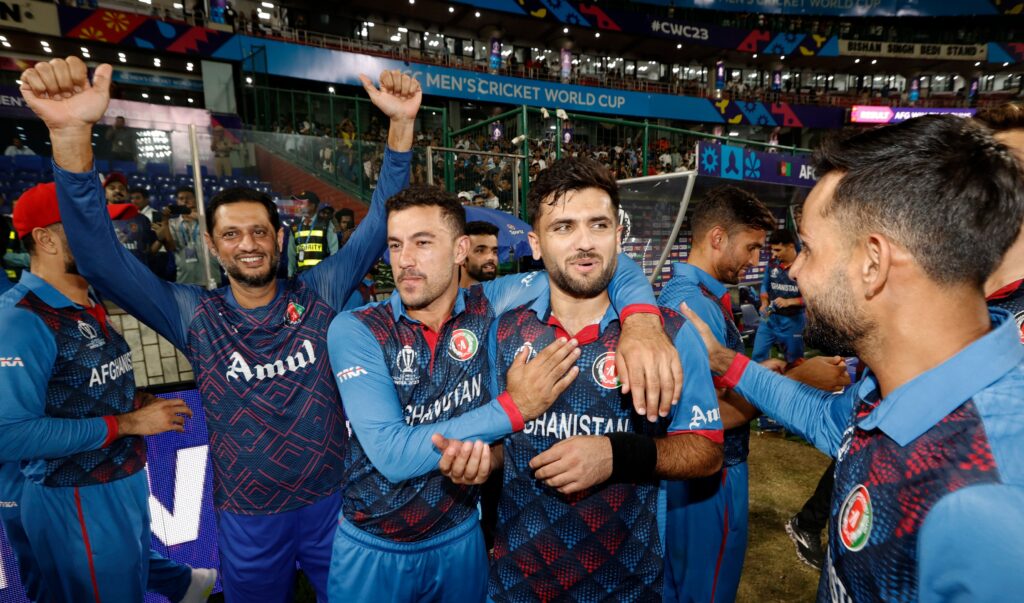
RevSportz Comment
We know what you’re thinking. What a ridiculous clickbait headline. Which lunatic would compare the four-time rugby world champions, South Africa’s mighty Springboks, with a cricket team that had won precisely five World Cup matches before Tuesday night’s thrilling tussle with Australia, five-time winners of cricket’s premier trophy?
But bear with us for a minute. Think beyond mere runs and wickets. Cast your mind back to what Siya Kolisi, the Springboks’ captain, said after edging out the All Blacks in the World Cup final. “People who are not from South Africa don’t understand what it means for our country,” he said. “It is not just about the game. Our country goes through such a lot. We are just grateful that we can be here.”
On paper, New Zealand were favourites to win that rugby final. But if you’d watched the rousing rendition of Nkosi Sikelel’ iAfrika before kick-off, you would have seen that there was far more than a trophy at stake. Whether it was Kolisi, Bongi Mbonambi, Ox Nche or Cheslin Kolbe – men who wouldn’t have been allowed to wear the famous shirt a generation earlier under apartheid laws – the raw emotion as they sang told you just what the All Blacks were up against.
“There are so many people who come from where I come from who are in hopeless (situations),” Kolisi would say later. “There’s so much division in the country, but we show, as people with different backgrounds, that it is possible to work together in South Africa, not just on the rugby field but in life in general.”
For New Zealand’s players, it was one of the games of their lives. For the South Africans, it was so much more. In the end, that mattered. You can see exactly that with Afghanistan in this World Cup. When they do their post-match interviews, they’re not thanking mum, dad, wife and cat. They talk of the thousands whose lives have been destroyed by a terrible earthquake in Herat. They speak movingly of the millions of refugees who Pakistan are pushing back across the border. They take defeats on the chin. But the victories aren’t about the players and coaching staff. They’re for the millions who have nothing to cling to.
At least Kolisi and his teammates have the luxury of running out in front of raucous home crowds at hallowed stadiums like Ellis Park and Loftus Versfeld. Afghanistan’s cricketers are international sport’s nomads. Not one of the 285 fixtures they have played since 2009 has been on home soil. Venues as far apart as Sharjah and Dehradun have been their ‘home’ ground, but a return to the roots remains as far off as ever.
When these players talk of refugees, it isn’t politically correct lip service. This is lived experience they speak of. Raees Ahmadzai, one of the assistant coaches, is part of that generation that learned the game in refugee camps around Peshawar. The humble tennis ball and various planks of wood gave them their first lessons. Ahmadzai played against India and South Africa at the World T20 in 2010, barely a decade after he first put wood to yellow ball. And his is no isolated story.
Many of the players are tired of the bullets-and-bombs narrative. And they no longer wish to be international cricket’s mercurial men. Under the coaching of Jonathan Trott, with inputs from Ajay Jadeja, Afghanistan’s cool and calculated approach in this tournament has been a revelation. At the halfway stage at the Wankhede against Australia, they had made 122-2, steady rather than spectacular. Even at the 40-over mark, the run-rate was below 5. But 64 came in the final five overs, as Rashid Khan, thrillingly, and Ibrahim Zadran, in more orthodox fashion, started swinging from the hips.
Zadran spoke of Sachin Tendulkar’s visit to the Afghanistan nets on Monday, and the long chat he had with the master. But this was about far more than mentors and advice. This is a team that bubbles with Rashid Khan’s infectious energy, but is now being led by Hashmatullah Shahidi, whose composure while chasing targets has been such a feature of this campaign.
Shahidi’s father, who passed away in 2018, wanted him to be a scientist. The son grew up seeing the dozens of physics textbooks the father had written, but his dreams centred on the velocity with which a red ball could be propelled by a shaft of willow. But where previous captains could be excitable and emotional, Shahidi emphasises calmness and professionalism. There is a reason that not one of their wins has been a fluke, or even a nail-biter. Much thought and planning has gone into this campaign, and while the world may have seen them as gallant underdogs, that’s not how these players see themselves.
There’s little doubt their compatriots view them differently now. Moska Najib, a writer and journalist, has lived in Delhi since she was nine. After the victory against Pakistan, she wrote on Scroll: “I no longer question, “What’s the point of it all?” because I’ve come to understand the unifying power of this sport in Afghanistan. I’m moved when our national anthem blares, echoing the unity of hundreds of thousands of Afghans, chanting proudly. The joy multiplies when friends from all over the world congratulate us on our remarkable victory, and scrolling through social media, one witnesses the collective celebration.”
Moska’s father was Dr Najibullah, a former president of Afghanistan who was murdered by the Taliban. When she and thousands like her, who have endured so much, tell you that this team gives them goosebumps, you know that they have transcended sport. They may not win a trophy like the Springboks did. But what they’ve done over the past month in India will live on for generations.



